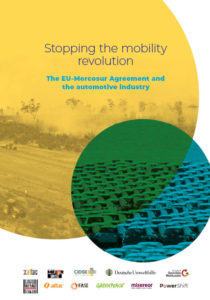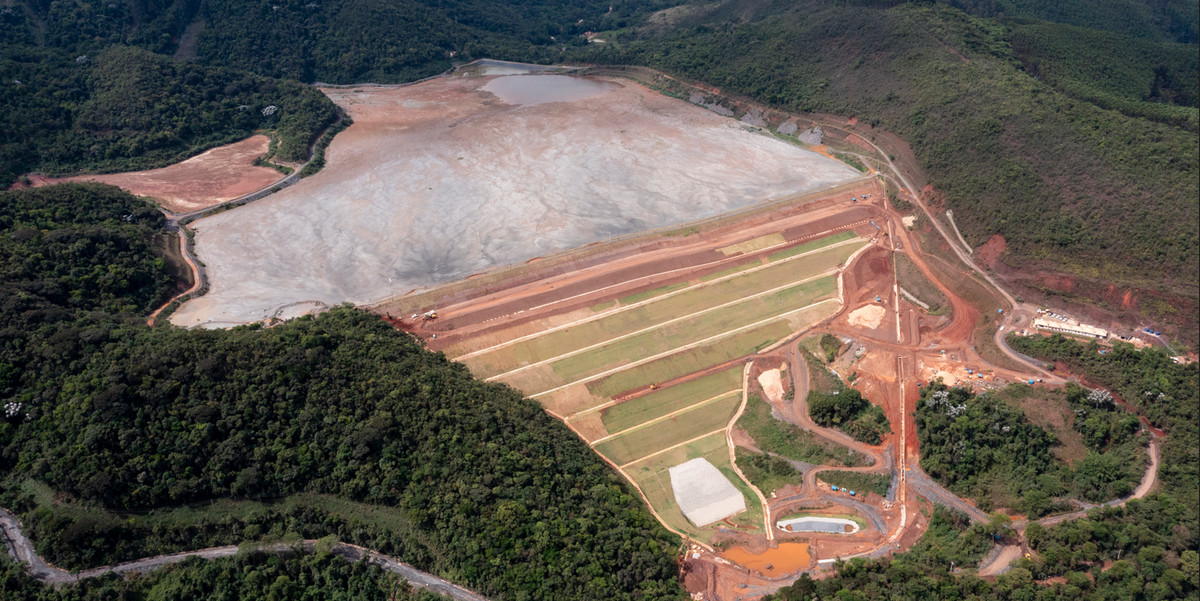New study reveals: the EU-Mercosur agreement promotes the automotive industry at the expense of climate and human rights
This weekend, EU Commission President Ursula von der Leyen and Brazilian President Luis Inácio Lula da Silva want to iron out the final differences on the planned EU-Mercosur trade agreement on the sidelines of the UN Climate Change conference (COP28) in Dubai. The agreement could be finalised as early as next week. CIDSE, Misereor, PowerShift, Attac and other NGOs are warning against a premature finalisation and are calling for a fundamental renegotiation of the agreement to protect the climate, forests and human rights.

According to their new study “Stopping the mobility revolution” car companies have significantly influenced the negotiations on the yet unsigned trade agreement between the EU and the Mercosur states – and would benefit particularly from this agreement. However, the lobbying activities were not only carried out by the car companies themselves. Internal emails show how employees of the German Ministry of Economic Affairs and the EU Commission actively approached business organisations to find out their wishes and feed them into the negotiations with the Mercosur states.
The result of successful lobbying is a treaty text that would eliminate tariffs on cars with internal combustion engines, car parts and raw materials for car production and promote the export of fuels derived from food and animal feed. As a result, the agreement increases the consumption of fossil fuels in transport and promotes climate-damaging resource extraction. “This agreement slows down the urgently needed move towards green mobility at the expense of public means of transport,” criticises Josianne Gauthier, Secretary General of CIDSE, adding: “We should focus on resource-saving and climate-friendly alternatives that enable mobility for all rather than fulfilling the profit expectations of the automotive industry.”
The organisations publishing the study believe that tariff reductions for combustion engines and agrofuels risk cementing dependence on fossil fuels and expanding soya and sugar cane cultivation for use as fuel at the expense of the climate and world food supplies. “More than ever, agricultural land is needed for food security, not for the production of meat or fuel for cars. With this agreement, the automotive industry wants to secure the export of its climate-damaging combustion engines for decades to come. In addition, the agreement favours even more food such as soya and sugar cane ending up in the tank. This would further fuel the global food shortage, which is based on a distribution crisis,” comments Tina Lutz from Deutsche Umwelthilfe (Environmental Action Germany).
The study describes in detail how the automotive industry benefits from close cooperation with politicians. This includes the gradual elimination of all tariffs on cars and car parts and on important raw materials such as iron and steel, aluminium, copper, lead, zinc and lithium, which is important for electric cars. The Mercosur states are also waiving export taxes on soya, biodiesel and cowhide (car seats). “The EU-Mercosur agreement is a car-for-meat deal that primarily serves one purpose: to reduce the production and import costs of manufacturers of climate-damaging cars. It has nothing to do with a fair and sustainable trade agreement. It must be stopped,” explains Theresa Kofler from Attac Austria.
The agreement also poses enormous risks for the climate, environment and human rights. It would facilitate and increase the export of soya, bio-ethanol from cane sugar, cowhide and metallic raw materials for the automotive industry. “As the study illustrates using case studies, livestock farming, the cultivation of soya and sugar cane and the mining of metallic raw materials in Brazil, Argentina and Paraguay are mainly responsible for deforestation, the displacement of indigenous communities, environmental damage and human rights violations,” explains Armin Paasch from Misereor. “However, the sustainability chapter of the agreement does not provide for any sanctions if such damage occurs.” In addition, the Commission is considering splitting off the cooperation section, in which the human rights clause is anchored, in order to speed up the adoption of the agreement. “Without the human rights clause, the EU would have no means of dealing with the kind of human rights violations that are to be feared under future Argentinian President Javier Milei. That is irresponsible. It is time for the EU to recognise the problems associated with non-transparent and undemocratic agreements such as EU-Mercosur,” says Bettina Müller from PowerShift.
“In order to effectively protect the climate, the environment and human rights, we finally need a trade policy that doesn’t just serve a few very powerful lobby groups.” Ludwig Essig, coordinator of Netzwerk Gerechter Welthandel (Network for Fair International Trade), adds: “A fundamentally new trade and investment policy is absolutely essential, especially in these times. To achieve this, we need transparent and democratic negotiations, strong sustainability chapters and an end to the weakening of our environmental and social standards.”
The study is published by CIDSE, Misereor, Deutsche Umwelthilfe, Greenpeace Germany, PowerShift, Attac Germany, Attac Austria and Netzwerk Gerechter Welthandel.
NOTES TO THE EDITORS
CIDSE is an international family of Catholic social justice organisations. We work with global partners and allies to promote justice, harnessing the power of global solidarity to achieve transformational change for people and the planet. We challenge systemic injustice and its destructive impacts through connecting, mobilising, influencing and telling stories of change. We promote environmentally and socially just alternatives to allow everyone to thrivein our common home. CIDSE’s work is guided by Catholic Social Teaching and Gospel values. www.cidse.org
CIDSE members are: Broederlijk Delen (Belgium), CAFOD (England and Wales), CCFD-Terre Solidaire (France), Cordaid (the Netherlands), Development & Peace (Canada), Entraide et Fraternité (Belgium), eRko (Slovakia), Fastenaktion (Switzerland), FEC (Portugal), FOCSIV (Italy), Partage Lu (Luxembourg), KOO (Austria), Manos Unidas (Spain), Maryknoll Office for Global Concerns (USA), MISEREOR (Germany), SCIAF (Scotland), Trócaire (Ireland), Vastenactie (the Netherlands).
MEDIA CONTACTS
- Armin Paasch, Policy Officer, Misereor (Armin.Paasch(at)misereor.de
- Giorgio Gotra, CIDSE Communications Manager, gotra(at)cidse.org
Cover photo: Mining activities jeopardising the preservation of a national park in the Brazilian state of Minas Gerais. Credit: Florian Kopp.

